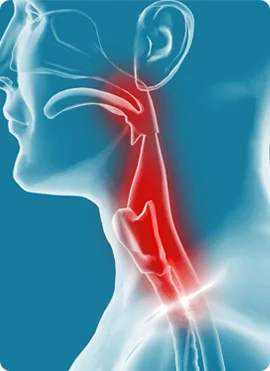Swallowing
Disorders
 What are Swallowing Disorders?
What are Swallowing Disorders?
Most everyone has had problems swallowing at one time or another. We may have trouble chewing a tough piece of meat, or we may gag on food, or have to swallow hard to get it down. And most people have had a drink “go down the wrong way,” making us cough and choke.
Patient’s with swallowing disorders will have trouble like this a lot of the time. A swallowing disorder is also called dysphagia.
Stages of Swallowing
Swallowing happens in three stages, or phases. You can have a problem in one or more of these phases, they include:
Oral phase:
Sucking, chewing, and moving food or liquid into the throat.
Pharyngeal phase:
Starting the swallow and squeezing food down the throat. You need to close off your airway to keep food or liquid out. Food going into the airway can cause coughing and choking.
Esophageal phase:
Opening and closing the esophagus (the tube that goes from the back of your throat to your stomach). The esophagus squeezes food down to the stomach. Food can get stuck in the esophagus. You may also throw up a lot if there is a problem with your esophagus or if you have acid reflux (commonly known as indigestion or heartburn).
Signs of Swallowing Disorders
Signs of a swallowing problem might be any of these:
- coughing during or right after eating or drinking
- clearing your throat often after eating or drinking
- having a wet or gurgly voice during or after eating or drinking
- feeling like something is stuck in your throat or chest after eating or drinking
- needing extra work or time to chew or swallow
- having food or liquid leak from your mouth
- food getting stuck in your mouth
- having a hard time breathing after meals
- losing weight
A swallowing problem might cause you to have these conditions:
- dehydration or poor nutrition
- food or liquid going into the airway, called aspiration
- pneumonia or other lung infections
- reflux
Some people with swallowing problems feel embarrassed when eating or feel badly about their swallowing problems and want to eat alone.
Causes of Swallowing Disorders
Many conditions can cause swallowing problems. Some medications can cause dry mouth, which makes it hard to chew and swallow. Other causes include the following:
Damage to your brain or nerves from any of these:
- stroke
- brain injury
- spinal cord injury
- Parkinson’s disease
- multiple sclerosis
- amyotrophic lateral sclerosis (ALS, or Lou Gehrig’s disease)
- muscular dystrophy
- cerebral palsy
- Alzheimer’s disease
Problems with your head, neck, or mouth, such as these:
- cancer in your mouth, throat, or esophagus
- head or neck injuries
- mouth or neck surgery
- bad teeth, missing teeth, or dentures that do not fit well
Testing for Swallowing Disorders
An SLP can test you to see how you eat and drink. You will want to see an SLP who works with adults with swallowing problems. The SLP will do the following tasks:
- Ask you about your health, past illnesses, surgeries, and swallowing problems.
- See how well your mouth muscles move.
- Watch you eat to see how you sit, how you feed yourself, and what happens when you swallow.
- Do special tests, if needed. The SLP can watch how you swallow using:
Modified barium swallow – you eat or drink food or liquid with barium in it. Barium shows up on an x-ray so the SLP can watch where the food goes.
Endoscopic assessment – the doctor or SLP puts a tube with a light on the end of it into your nose. This tube has a camera on it, and the SLP can watch you swallow on a screen.
